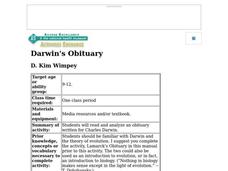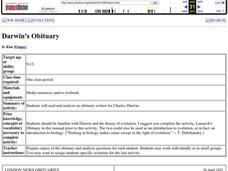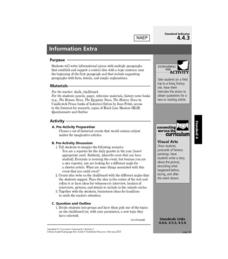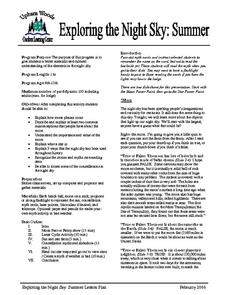Curated OER
Irregularly Scheduled Programming
Learners examine their favorite holidays and how they are celebrated. After reading an article, they discuss the length of television programming for the Super Bowl. In groups, they create their own television programming relating to...
Curated OER
A Historic Gamble
Young scholars explore and evaluate the economic impact of legalized gambling on Native American Indian communities. They draft short, persuasive speeches that take the perspective of a tribal elder appearing at a town council meeting.
Curated OER
Heightening Awareness
Students review their prior knowledge about Haiti. They examine violence in Haiti by reading and discussing "HAITIAN FORCES BATTLING UPRISING REPORT RETAKING 3 TOWNS." In groups, students research specific time periods of Haitian history...
Curated OER
Breezy, Chilly, or Freezing?
Students assess the factors which influence the sensation of being "cold" in a particular situation. They study the complexities in measuring temperature by reading and discussing the article "Beyond Brrr: The Elusive Science of...
Curated OER
Laws and Force in Law Enforcement
Learners investigate the issues of police brutality, use of excessive force, and the underlying issues by participating in a round-table discussion. They compare how these issues are explored differently in different types of...
Curated OER
The ABC's of DNA
Students describe genetics as if they were explaining it to a young child. After reading an article, they discover new discoveries in the human genome project. Using the internet, they research a pair of genetic terms and develop a...
Curated OER
To the Beat of a Different Drum
Students describe the sounds, moods and styles of two different types of music. After reading an article, they discover how a journalist uses language to describe and give feelings to the music. They review a type of music of interest...
Curated OER
Pardon Me
Young scholars examine the pardon process and the controversy surrounding the Clinton pardons through reading and discussing "Lobbying for Forgiveness." They write a forgiveness letter and create pardon guidelines for President Bush.
Curated OER
Taking the Witness Stand
Students identify a pivotal event in world history that they would have liked to have witnessed. They then research this event and write a first-person account of it as if they had been present. Their first-prerson account is modeled...
Curated OER
Write Away
Students examine the effect of computers and other word processing programs have had on traditional forms of communication and expression after reading and discussing the article "Where the Pen is Mightier Than the PC" from The New York...
Curated OER
What Kind of Volcano Is This?
In this volcano learning exercise, students are given five pictures of volcanoes and descriptions of each. They determine what type of volcano each is and how they determined their answers.
Curated OER
Enough About I — Let’s Talk About Me
Students review parts of speech and share informative usage presentations to their classmates. In this grammar lesson, students discuss the importance of using appropriate speech and then read "The I's Have It." Students create their own...
Curated OER
John Brown's Passion to End Slavery Leading Up to and Including the Rain at Harpers Ferry
Sixth graders investigate John Brown's fight to end slavery. For this slavery lesson, 6th graders read Harpers Ferry, The Story of John Brown's Raid and then research his life as well as the life of slave Osbourne Perry Anderson....
Curated OER
Darwin's Obituary
Students read and analyze an obituary written for Charles Darwin. They are already familiar with Darwin and the theory of evolution. This is an introduction to evolution, or in fact, an introduction to biology.
Curated OER
Darwin's Obituary
Students read and analyze an obituary written for Charles Darwin. They make a list of facts about Darwin they learned from the obituary. Students compare Lamarack's theory to Darwin's.
Curated OER
Where I Come From
Young scholars examine family traditions as a microcosm of larger cultures. They examine their own family traditions to identify how beliefs, values, and customs vary from culture to culture and how those traditions influence their...
Curated OER
Graphs
In this graphs worksheet, students solve and complete 9 various types of problems. First, they use a large scatter graph to complete a described trend in data. Then, students find the difference of negative numbers and place them in...
Curated OER
All That's Fit To Print
Students use an editor's checklist to help them proofread examples of other students writing, then edit a worksheet embedded in the plan. In this writing and editing lesson, students look for capitalization, spelling, and grammatical...
Curated OER
Information Extra
Learners create a paragraph about a subject of their chosing that is informative. In this paragraph writing lesson plan, students use graphic organizers and work together in groups to create a full, organized paragraph. This lesson plan...
Curated OER
Thesaurus Forage
Looking for a game that teaches students about how to use a thesaurus, and reinforces the concept of synonyms? Each player will have the opportunity to use their "tools" in this engaging lesson. They will use their thesauruses in order...
Curated OER
Heat Loss and Cool Gains
Fifth graders predict what happens when cold and hot water are mixed together. In this physics lesson, 5th graders discuss how heat transfer takes place. They record temperature readings and compare it with their prediction.
Curated OER
Science Giants
Fifth graders research about the work and accomplishments of their chosen scientist. In this life science lesson, 5th graders explore how to become one. They prepare a presentation and share it with the class.
Curated OER
The Value of a Garden
Students explore the history of taxonomy, the work of Carl Linnaeus, and the factors involved in the decline and extinction of a variety of botanical species.
Curated OER
Exploring the Night Sky: Summer
Students explain how moon phases occur. They describe and explain at least two common misconceptions that people have about the moon. Students explain what a star is. They explain 3 ways that the night sky has been used throughout history.

























